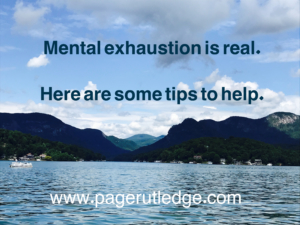I am a member of the Anxiety and Depression Association of America (ADAA), and they often publish articles of value that I like to share with you. The following “Ten Tips For Dealing With Mental Exhaustion” is one such article.

- Simplify tasks. If you are feeling overwhelmed, break tasks into smaller pieces, and acknowledge each accomplishment. Teachers know this as “chunking” tasks, and it helps to prevent mental exhaustion.
- Recognize and limit your stressors. If the news becomes too much to bear, limit your media exposure. Watch TV or go on social media just 30 minutes a day, then turn it off. If certain friends or family members trigger you, limit exposure to them as well.
- Ask for help. If you feel like your plate is too full, don’t be afraid to ask your kids (including adult children!) and your spouse or partner to pitch in with household chores or a co-worker to lend a hand with a work project.
- Build in breaks. When working from home, it’s easy to find yourself working all the time. Build in frequent breaks and do something relaxing, whether it’s a walk around the block, a short stint on a hobby or just sitting with your eyes closed for 15 minutes. Eat lunch in the kitchen, not at your desk.
- Create boundaries. If you haven’t already, create a separate space for a work office, and establish boundaries so that you have separate time and space for specific things like work, home, family and yourself.
- Care for you. Find ways to exercise, relax and improve your sleep Learn to say no when asked to do too much. Saying yes to all is a certain path towards mental exhaustion! Assign yourself at least a half-hour every day to spend on one life-affirming thing for you: reading, walking in nature, cooking, playing with your dog, watching a comedy on Netflix, whatever it is that reminds you that life is good.
- Acknowledge what you can control and what you cannot. You can’t affect the overall COVID-19 situation in your city, but you can reduce your personal risk. Learn to accept that you don’t know what the future holds — and that’s OK, because you do know how to manage yourself.
- Learn mindfulness techniques. When your mind is racing, stop and make note of it. Slow. Things. Down. That, in essence, is mindfulness. “Become an observer of your mind,” Kissen says. “The mind is like a monkey swinging from branch to branch. Practice directing your mind to a certain branch and anchor it there. It’s like playing a game with a child — you can redirect your mind to anything of value in our life. Then you are not always problem-solving and spinning your wheels.
- Remember that abnormal is the new normal. In the time of COVID19, we all need to set new standards for what we think is normal. Mental exhaustion comes from feeling overwhelmed. Focusing on the present moment and the joy in a given day is more important than ever. Dashing off a quick email to someone to thank them for support is a quick way to feel good!
- If necessary, seek professional help. “If you are really depressed or your anxiety is more than you can cope with, ask for professional help,” Schwartz says. Ask your primary care physician for a referral. There are also many mental health hotlines and online resources, and telehealth often works for mental health therapy, she says. A couple of sessions with a CBT therapist can give you more tips and tools to help you through. “It doesn’t have to be lifelong therapy,” she says. “It’s like meeting with a trainer and starting a new exercise routine.”
Original Author and Publishing Source: Debra Kissen, CEO of Light on Anxiety CBT Treatment Center in Chicago, 6/25/20 Excerpted and lightly edited for brevity from report on: WTOPNews.comhtly











